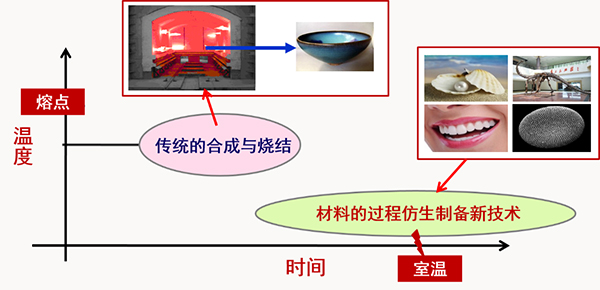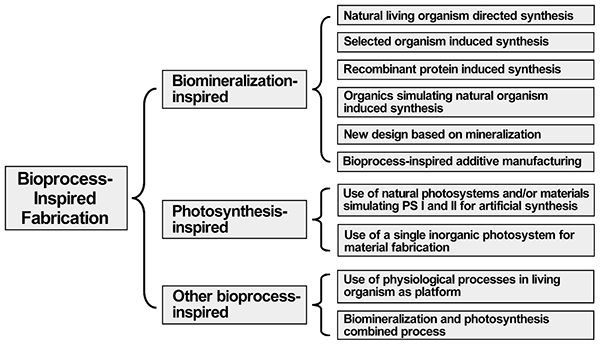
A review, namely, Bioprocess-inspired fabrication of materials with new structures and functions, written by Professor Fu Zhengyi ’s team was published in the internationally renowned academic journal Progress in Materials Science (2019, 105, 100571). In this review, the advance of bioprocess-inspired fabrication of materials was introduced and evaluated, some new ideas and directions that need to be emphasized in the future were covered for the first time.
The fantastic micro/macro structures of bio-systems contribute to the special functions of bio-systems in withstanding and adapting to the environment. Therefore, these structures and functions have provided enormous inspiration for designing materials with new structures and functions, resulting in the research direction – bio-inspired materials, an exciting research topic in the past twenty years.
Furthermore, Nature has created various efficient bioprocesses through billions of years of evolution and natural selection. In general, the structure-forming processes of bio-systems are equally fantastic, being performed in most cases at ambient temperatures. Fu’s team believes that natural structure-forming processes are well worth studying in pursuit of new techniques for fabricating advanced materials with novel structures and functions. Hence, a new research direction, called “bioprocess-inspired fabrication” has been proposed. A proposed definition of bioprocess-inspired fabrication is “finding inspiration and ideas to develop new synthesis and processing techniques by learning from the structure formation processes in nature”.
It is well established that materials science and engineering has four aspects: processing, structure, properties and performance. For natural bio-systems, there are also four such elements. Bio-inspired materials are about natural biological structures, or biological structure-performance relationships. Yet, bioprocess-inspired fabrication of materials is different. It mainly focuses on the natural fabrication process, or its relationship with the biological structure, so as to develop new synthesis and processing techniques.

The concepts and ideas of “bioprocess-inspired fabrication of materials” and “ bio-inspired materials”.
Traditional ceramic sintering preparation often requires high temperature to achieve, while natural materials complete the structure formation at room temperature, resulting in exquisite microstructure and excellent mechanical properties. The bioprocess-inspired fabrication of materials gives us two wonderful expectations. One is to learn the biological manufacturing process and develop a new material synthesis and processing technology in the room temperature or low temperature. The second is to be inspired by the natural structure-forming processes to develop and innovate the existing processing techniques.

The wonderful expectations that bioprocess-inspired fabrication of materials can bring.
In the previous research, Professor Fu Zhengyi's team considered that natural structure-forming processes that are well worth studying include biomineralization, photosynthesis and other bioprocess-inspired fabrication methods. . The team also used the natural biological living shells as a synthesis platform for the first time. A series of papers around it have been published in top journals in materials and chemistry, namely, Confined-space synthesis of nanostructured anatase, directed by genetically engineered living organisms for lithium-ion batteries(Chem. Sci., 2016, 7, 6330), Photo-assisted synthesis of Au@PtAu core-shell nanoparticles with controllable surface composition for methanol electro-oxidation(J. Mater. Chem. A, 2016, 4,18983; Nanoscale, 2019, 11,11451).

The implementation of bioprocess-inspired fabrication of materials research plans
This article reviews and prospects the recent research of Fu Zhengyi's team and other international research groups in this field. Bioprocess-inspired fabrication of materials will convey far-reaching implications for materials science, life science, biology, chemistry and other related interdisciplinary fields. Progress in Materials Science is the most authoritative journal in the field of materials science. It contains the most important research progress and reviews of the field with an average impact factor of 33.018 for 5 years. This paper shows that bioprocess-inspired fabrication, as a new direction, has great potentials.
|
|